FG to establish a biomedical engineering programme.
To combat the shortage of well maintained medical equipment, the federal government has pledged to launch a National Biomedical Engineering Programme. On Saturday in Abuja, following a visit to the National Hospital, Abuja (NHA), Prof. Ali Pate, the Coordinating Minister of Health and Social Welfare, made these remarks.
Pate acknowledged that some of the hospital’s infrastructure is more than 20 years old and has been stressed by the hospital’s high patient traffic, long operating hours, and varied patient needs.
A lot of your extremely crucial equipment has been sitting around for a long time but is now broken because “things just get old.” Some are used in radiology, some in the treatment of cancer, still others are either inoperable or hopelessly out of date.
That’s a glaring problem, he said; “we need to figure out how to fix that in a major way.” However, he noted that the equipment and maintenance problem is not unique to NHA and that he had seen it at other tertiary institutions as well.
“Therefore, we will launch a national biomedical engineering programme in the Federal Ministry of Health and Social Welfare to attempt to start addressing the deficiency in equipment maintenance,” he stated.
He also addressed the issue of the hospital’s power supply, saying that his ministry will coordinate with the Ministry of Power and the power holding companies to determine what measures could be taken to provide hospitals priority, if not all, then at least partial, power.
Since diesel is so expensive, he says, an evaluation is underway to determine what services each university hospital need, with the goal of providing solar power as an option. He also praised the hospital administration for providing care to all emergency patients for the first 24 hours without regard to their ability to pay.
I’m relieved to learn that you treat emergency patients without regard to their ability to pay in the first twenty-four hours because saving lives is your first priority.
“That is a very important notion to keep in mind so that we ensure that we put our patients and our people first in everything that we do,” he said. He guaranteed his full backing for the hospital’s efforts and pushed it to fulfil its mission.
The minister stressed the importance of hospitals in the ministry’s mission to improve the health and wellbeing of Nigerians.
You (CMD), as the hospital’s leader, along with other leaders in our national hospitals will need to step up your game in responding to patients’ presence, ensuring facilities are functional, tracking the quality of services, and ensuring patients have a very positive experience with the government.
He explained that he was doing an evaluation of federal hospitals across the country, and that this particular visit was part of that process. We’ve visited a few already, and we’re at Abuja’s National Hospital today to talk about how we can better put patients at the centre of healthcare in Nigeria.
The Nigerian people, he said, “deserve the greatest quality services possible within the resources available, and I want to examine the leadership of the hospital and its administration to let them know that.”
Prof. Muhammad Mahmud, the hospital’s Chief Medical Director (CMD), has previously stated that the facility’s original intent was to serve as a quaternary hospital for children, followed by a hospital for mothers and children.
This, he claimed, had put a burden on the hospital’s infrastructure, which had just been in place for the past two decades. He claims that the hospital’s funds and attention have diminished over time, contributing to its current state of decadence.
“Sir, I want to assure you that everyone is ready to give it their all if we have a chance to enhance our results,” he said.
You’ve travelled independently to inspect obsolete machinery; we’re all aware of the country’s maintenance woes; we also know that the country’s biomedical technology or medical maintenance departments are particularly lacking.
He warned that things would remain difficult until the government provided adequate funding for the hospital to bring it up to par.
Mahmud stated that the hospital’s administration had made numerous attempts over the years to keep the facility open and even expand it, but that a number of limitations had stymied those efforts. But he was optimistic that the minister’s visit and the assurances he made will help the hospital reach the standards befitting a world-class tertiary care facility.
Our goal is to attract customers not just from Nigeria, but from around West Africa. Therefore, once we reach that point, we will succeed even without extensive marketing.
If Nigeria is able to properly utilise its resources and workforce, it would be successful.It’s possible that we’ll run into problems securing financial backing, but if we have the necessary know-how and ability, we can overcome these obstacles.




